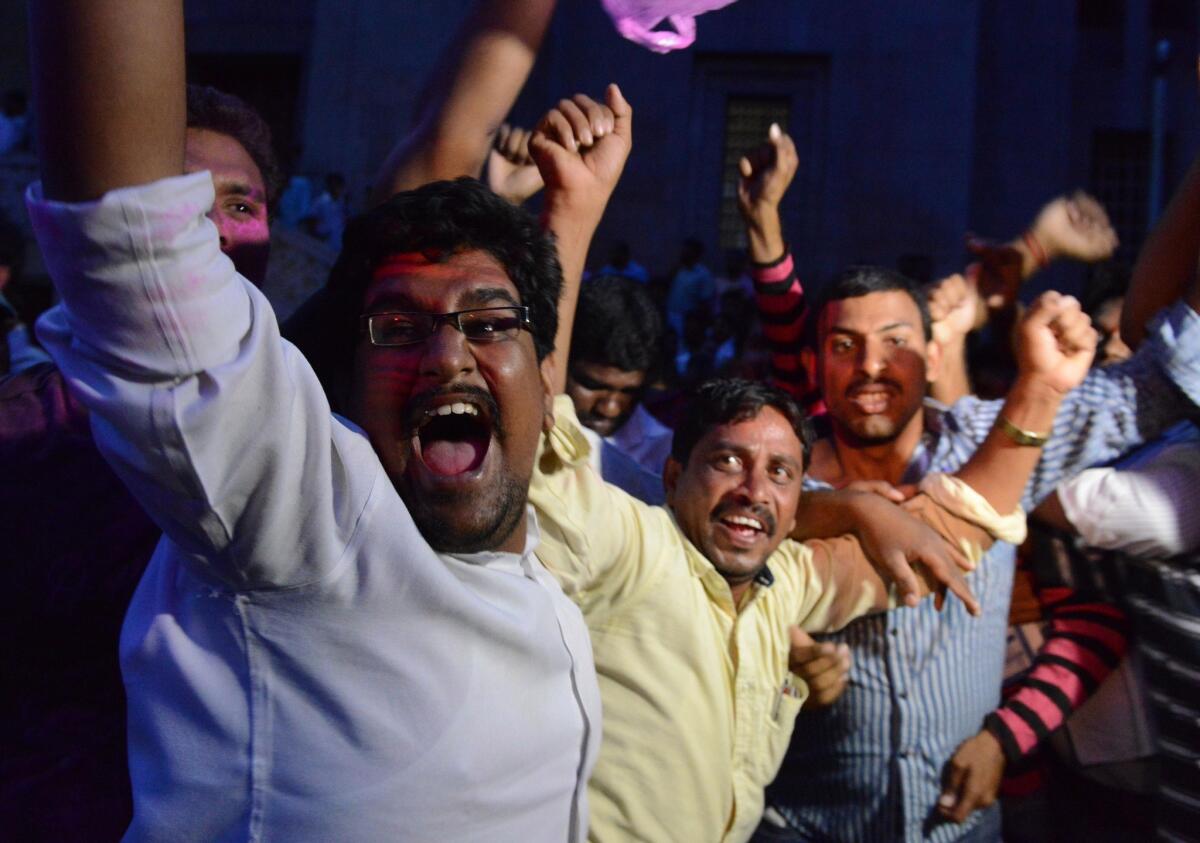India close to creating a new state, its 29th

- Share via
NEW DELHI –- India took a crucial step toward the creation of its 29th state Tuesday when the ruling Congress Party gave the idea its blessing.
Supporters of a separate state of Telangana, which would be carved out of southern Andhra Pradesh state, have been campaigning for decades in hopes of boosting their political voice and garnering more economic resources. Tuesday’s move paves the way for a parliamentary vote in the legislative session beginning Aug. 5.
As news of the breakthrough spread, students at Hyderabad’s Osmania University, some carrying signs that read “Hail Telangana,” whooped, cheered, hugged, set off fireworks and handed out candy.
Assuming no unforeseen setbacks, the state could emerge from the delivery room within about six months. Creating a new state in India is relatively easy provided there’s political will, prompting legal experts to call the country “an indestructible union of destructible states.”
The government has long balked at the idea in part out of fear that the precedent would lead numerous other regional groups to attempt to forge their own political entity, a scenario that seems likely.
Political calculations finally tipped the balance. The ruling Congress Party faces a tough national election next year on the heels of a weak economy, policy drift and a rash of corruption scandals and sees the support of a newly formed Telangana as essential in any possible victory scenario.
“This is nothing but political expediency,” said T.R. Ramachandran, a New Delhi-based political analyst. “The Congress Party is caught in a real jam with no real chance of power for a third term because it’s losing on all fronts.”
After India’s 1947 independence from Britain, New Delhi consolidated many princely kingdoms into 14 states in 1956. Many of these were further subdivided – there were 19 states by 1966 and 25 by 1987 -- with the last three created in 2000.
Adding a new state presents a host of practical problems. Hyderabad, the capital of Andhra Pradesh, is geographically part of Telangana. Congress Party officials announced a compromise Tuesday: Hyderabad will remain a joint capital for 10 years, giving the rest of Andhra Pradesh enough time to create its own base.
Water rights also need to be finessed, given that most of the catchment area for the region’s two major rivers lies in the Telangana area, which also supplies nearly two-thirds of the state’s revenue. On the other hand, Telangana is largely barren with an acute power shortage.
Supporters said the area has also suffered from politicians’ inability to make a decision. “Uncertainty over state division has affected growth in the region, with big investors unwilling to invest here because of the uncertain future,” said Karthik Reddy, 25, an architect in Hyderabad. “Development will increase once the picture gets clearer.”
A key argument made by those opposed to a new state – including top Andhra Pradesh officials wary of having their electorate halved – is that the division will create security problems. The Telangana area is heavily populated by Maoist insurgents.
Home Minister Sushil Kumar Shinde downplayed the security threat Tuesday, however, in a view echoed by analysts. “Terrorism is a socio-economic problem,” said K. Nageshwar, a professor at Hyderabad’s Osmania University, “not a geographical problem.”
While there are still several procedural steps before the state takes shape, Tuesday’s approval by political allies and the powerful Congress Party Working Committee clear the biggest hurdle. The proposal still faces Cabinet approval, and the president must submit a bill to the Andhra Pradesh assembly for review before the government refers it to the Parliament.
The Congress Party promised the new state in 2004 and 2009 only to balk, and some said that could happen again, given the vagaries of Indian politics. “There is still a question whether Congress is sincere or just trying to please,” said Ramachandran. “There’s still an element of uncertainty.”
For most supporters, however, their dream of a better, more prosperous future were finally in sight. “I support a separate state for reasons that are close to my heart,” said Dilip Kumar, 25, a native of Nalgonda working at a trade magazine in New Delhi. “We’ve always been neglected. This needs to change.”
ALSO:
Pakistani lawmakers elect Sharif loyalist as country’s president
$136-million French Riviera jewel heist may be biggest in history
Tiger population leaps in Nepal as countries fight to halt extinction
Tanvi Sharma in The Times’ New Delhi bureau contributed to this report.
More to Read
Sign up for Essential California
The most important California stories and recommendations in your inbox every morning.
You may occasionally receive promotional content from the Los Angeles Times.










